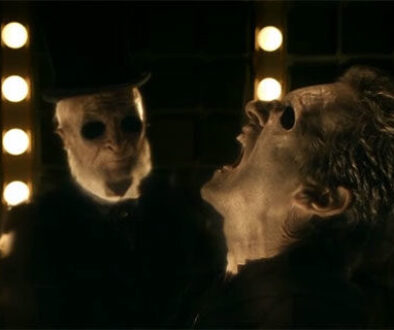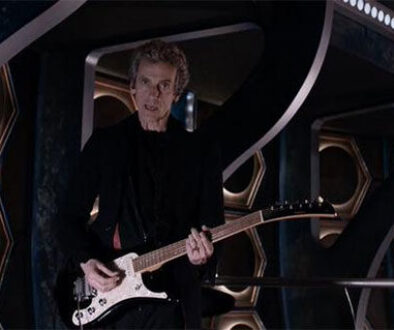Under the Lake Review
Clint Hassell gives his verdict on the third episode of Series 9.

A stellar script is the foundation for all terrific film, television, and theatre productions. It’s truly “lesson one” in any performing arts education. While a huge special effects budget, award-winning actors, and a talented crew can assuage some of the problems of a script, the final product is always lacking. Thankfully, Toby Whithouse’s script is amazingly layered and thoughtful, making “Under the Lake” not only an incredible episode, but perhaps the premiere that Series 9 really deserved.
From the beginning, Whithouse weaves in necessary exposition in a way that is harmonious to the narrative, making later payoffs surprising and enjoyable. For example, the TARDIS seeming “upset” at bringing the Doctor and Clara to the underwater mining facility reinforces the recurring theme of a sentient TARDIS, while explaining how the Doctor arrives at such an obtuse location, not coincidentally in need of his assistance. The short scene is requisite, yet organic.
An even better example of Whithouse’s integrated approach follows as Clara begs to return to a planet of long-necked aliens that have been celebrating New Year’s for two centuries. The scene paints Clara as a vapid party girl, in stark contrast to her personality through all of Series 8. To hear that she has willfully given herself over to this suppressed side of her personality is telling. Note that Clara desires “monsters [and] stuff blowing up.” None of the six Davies-era companions wanted to travel with the Doctor to experience the thrill of danger, but all three of the Moffat-era ones have, Clara to a dangerous extent. Including this subtle reference early in the episode’s first act – – even playing it for laughs – – not only builds on Clara’s storyline from Series 8, which hinted that she is addicted to traveling with the Doctor, it also calls into question why she feels the need to run, now, without directly referencing Danny Pink’s death.
The idea is revisited, later in the episode. Responding to the Cloister Bell, the Doctor and Clara share a short exchange in the TARDIS’ console room. “I want an adventure,” she states, rushing back to the danger outside, “Come on, you do too! . . . I want to save a planet!” The Doctor, realizing that Clara has taken on his reckless abandon, but not his thoughtful approach, cautions her behavior. “Because I have duty of care,” he chides. It is revealing that the conversation makes Clara uncomfortable, the look on her face displaying that she is, indeed, running from something. Had this scene occurred in isolation, it would heavy-handedly telegraph Clara’s character arc for Series 9; however, coming after the more humorous, subtle opening scene, the interchange between Time Lord and companion feels very natural.
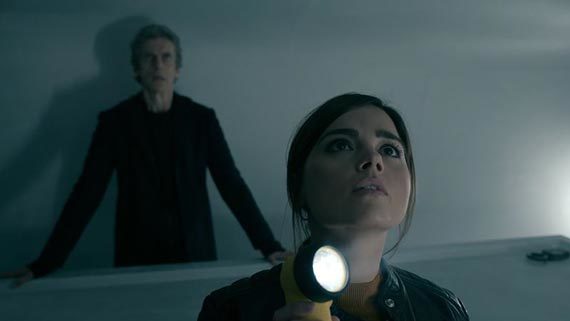
Whithouse’s talent for writing believable characters extends to the guest cast. Yes, Pritchard is a greedy, lubric stereotype who dies early in the story. While this would seemingly serve as yet another example of the Western theme of people getting what they deserve, Whithouse actually has a compelling reason to kill the character early: Pritchard is the only one who, later, wouldn’t have stayed with the Doctor and the remaining crew.
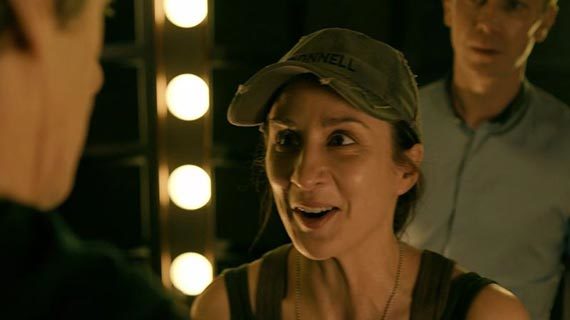
Speaking of, the scene where the Doctor and the mining crew theorize why the ghosts have signaled the paramedic team, and why they want the base in night mode is a good example of believable expository dialogue (though, the idea of turning off the routine checks on the life support systems and the water-tight doors at night, when the crew would ostensibly be asleep and unaware of developing problems seems questionable, at best). Also credible is that the crew barely notices Clara’s wellbeing, after capturing the ghosts in the Faraday cage. This makes sense as they have all lived and worked together as a crew, and she’s an outsider. It’s nice when Doctor Who remembers that its main cast wouldn’t realistically be the center of every scene, and here, as a bonus, Whithouse mines it for comedy.
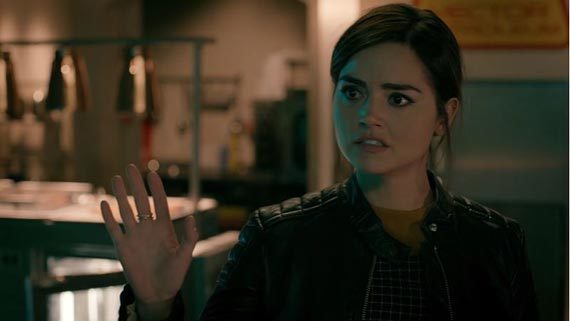
Most impressively, the crew is seen to tell Cass that Lunn is alive, a necessary plot point as she is deaf and he is her translator. The crew, and the script, take the time to address Cass’ special needs, yet never pander to her disability. She is defined more as a captain who is great at her job and a dedicated leader that does as much to rally her crew into action as the Doctor’s speech. Creating such a well-rounded character in the midst of a tightly plotted episode is difficult, but Whithouse uses these tiny moments to his advantage and treats Cass with admirable respect.
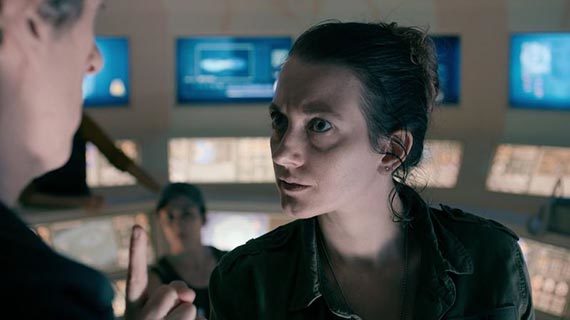
That being said, the most remarkable character development in “Under the Lake” involves the Doctor. First, Whithouse remembers that the Doctor is an alien. Having a non-Earth-centric point-of-view, the Doctor not only thinks of Orion’s sword in three dimensions, but also points out that one of its “stars” is actually a nebula. The Doctor also displays his alien nature in a scene where Clara uses pre-written notecards as prompts to guide the Doctor in conversing with humans he encounters. While the scene is hilarious, it is arguably the episode’s most important because it recalls a different Doctor – – One, perhaps – – from before his personality was portrayed as unerringly heroic. Here is the Doctor in his natural state, genuinely fascinated by something he hasn’t before seen. His first instinct isn’t to save the base, but to discover and know that which he does not. Saving the base is collateral damage, a running theme in the last several episodes. It takes a skilled writer to note, especially at the seeming expense of a lead character, that sometimes heroic actions are unintended consequences and not true motives.
This earlier scene is recalled later when the Doctor realizes that the “ghosts” are a natural phenomenon. A man of science, and not of superstition, the Doctor has been contemplating the apparitions this entire time, reinforcing that the Doctor is always one step ahead. Further, in realizing that someone is “deliberately killing people, hijacking their souls, [and] turning them into transmitters,” the Doctor grows angry. Despite referencing One’s inquisitive, wandering, man-of-science persona, Whithouse does not ignore one of the Doctor’s most enduring traits – – his overwhelming desire to help the oppressed. Whithouse follows this with a clever twist on the Doctor’s rousing speech, which reconceives the crew’s duty as officers and to science as a call to action. “None of you have chosen anonymous, selfish lives,” the Doctor notes. Here’s hoping this selfless decision portends a happy ending for the crew.
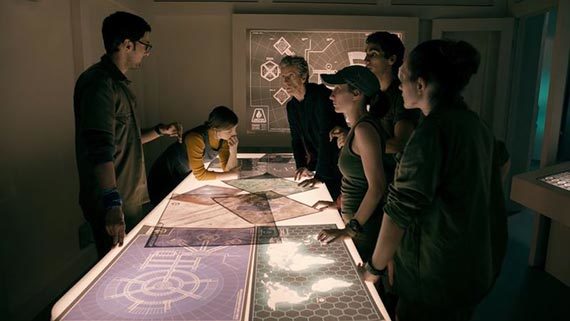
Compliments should be paid to Whithouse for deftly including a Tivolian – – previously created for his script, “The God Complex” – – in “Under the Lake.” Not only is Prentis’ inclusion a lovely callback to established continuity, it actually tips off observant members of the audience that something is incredibly amiss. Why else would the most cowardly alien in the universe attack the crew?
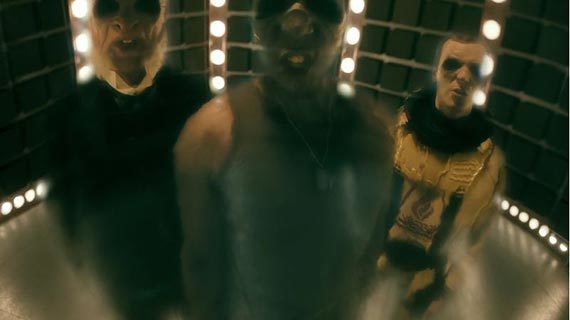
In fact, Whithouse includes several subtle clues that pay off later in the episode. Why doesn’t the ghostly Pritchard kill Lunn? Because Lunn hasn’t yet been inside the spaceship or seen its alien text, so he’d serve no purpose as a transmitter. Patient to let the answers be revealed in due time, the script gives enough hints that lingering questions will be satisfactorily answered. While all of their mystery hasn’t been explicitly detailed, it is at least evident that the “ghosts” are electromagnetic in nature, which is why they can be contained within a Faraday cage, and why they can only affect metallic objects.
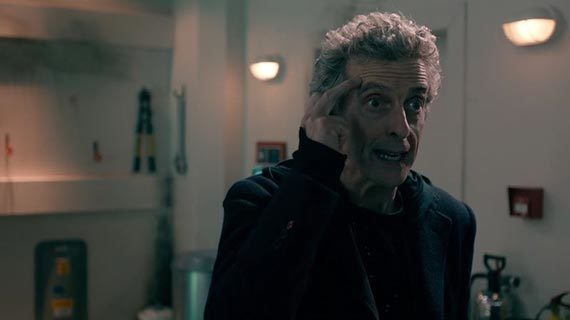
With such a layered script, it is amazing that Whithouse incorporates so many Who-centric references – – including the Autons, Clockwork Droids, Cybermen, Daleks, Gangers, and the Nethersphere – – without detracting from the plot. Whithouse weaves elements from Doctor Who’s 52-year legacy into a quality script that will endure the test of time. This is in opposition to Steven Moffat, who puts his spin on elements of canon, including them into stories that are so narratively important that the fandom has no choice to but to accept his now-definitive take.
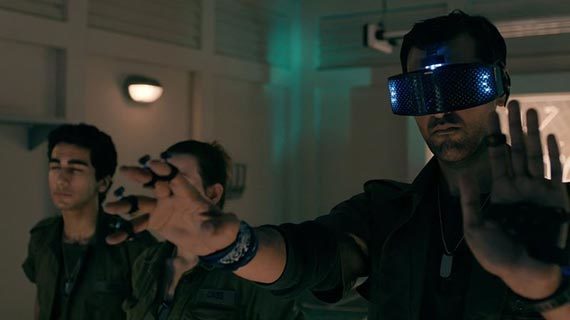
Perhaps the best compliment that can be paid to Whithouse’s script is this: beyond the many references to past episodes, “Under the Lake” feels like classic Doctor Who, particularly stories like “The Ark in Space.” Many late-Third and Fourth Doctor-era adventures created a believable alien setting by pushing most of the tiny budget towards a serviceable set and a decent monster, and then making sure the script was well-written. Not every episode needs to be a special effects extravaganza, and several modern-era stories, including “School Reunion,” “Greeks Bearing Gifts,” and “The God Complex” (all by Whithouse), but also “The Girl Who Waited,” “The Power of Three,” and “Listen” certainly prove this to be the case. Compare the emotional payoff of these episodes to Whithouse’s other Doctor Who scripts, “The Vampires of Venice” and “A Town Called Mercy,” which focused more on visual effects and cinematography, in order to justify the expensive sets and costumes, at the expense of greater character development.







